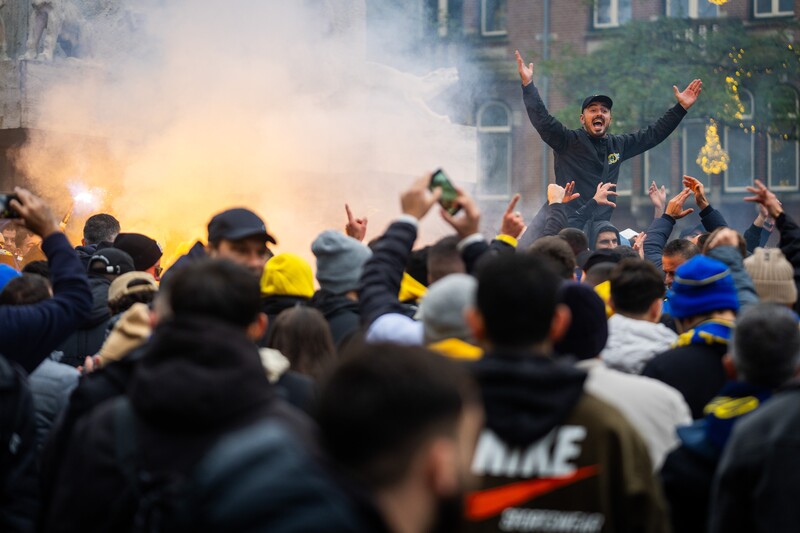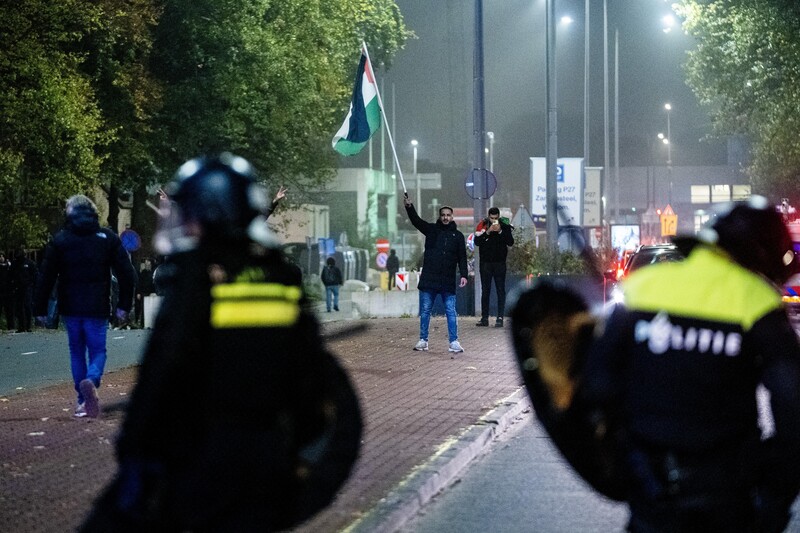The Electronic Intifada 5 November 2025

Maccabi Tel Aviv fans rioting in Amsterdam ahead of their match with local team Ajax on 7 November 2024. CCTV footage of assaults has gone mysteriously missing.
ANPA year ago, on 7 November 2024, Israeli football club Maccabi Tel Aviv played local club Ajax in the Dutch city of Amsterdam.
After the match, as Maccabi supporters were walking back to their hotels, dozens were reportedly ambushed by local citizens and beaten up. The alleged aggressors were widely portrayed as anti-Semitic Muslim migrants and the international uproar was instantaneous.
Missing from most stories, however, was that on the two preceding days, a mob of Maccabi fans had been singing racist chants and were openly insulting and abusive of residents who were Islamic or who expressed support for Palestinians. Evidence of their aggression was broadly underreported.
Among several complaints filed about the Israeli fans’ behaviour, on 14 November, Amsterdam police received two formal complaints of abuse in the metro from two local women.
One alleged they had been sitting on a metro train on 6 November when Maccabi fans told them: “We will kill all of you,” ostensibly because they were identifiable as Muslims.
The other case concerned a woman who claimed that several of the Israeli team’s supporters had assaulted her on the day of the match on a platform below the city’s central station after she had shouted “Free Palestine.” She said she was beaten, spat at and had her hair pulled.
Seven months later, however, on 15 June 2025, the public prosecutor’s office announced its decision to dismiss the two cases. The prosecutor’s office said it had failed to obtain recordings made by CCTV cameras operated by the public transport company GVB, and therefore the allegations could not be proven.
The prosecutor claimed that GVB had “erased” recorded images “earlier than normal” because on 12 November the recording devices had been removed and CCTV footage had not been kept for the normal 28-day retention period that is standard for recordings made at platforms.For recordings made inside trains, that period is seven days, which means the police report with regard to the death-threat incident had come in too late.
A GVB spokesperson confirmed the removal of the recorders to Dutch national broadcaster NOS. This had apparently been planned in advance, but GVB gave no reason. Then he – oddly – referred to the removal as a “necessary intervention.” This suggests that the removal of the recorders was done in haste. GVB later claimed the removed recorders had become “outdated,” but that doesn’t explain the rush.
Then the prosecutor’s office and GVB assured the public that the missing footage of the incident on the metro train didn’t matter anyway. Cameras on trains, they alleged, do not record sound and so could not have proven whether a verbal threat had been made.
But this is clearly contradicted by what GVB states on its website: “All our trams, buses, metro trains, and ferries are equipped with cameras (with audio recording).”
Six years ago, GVB had proudly reported that it had bought new cameras, including for metro trains, that would record both sound and images.
As for the retention period, on its website, GVB presents this as a matter of policy, not ordinary practice, i.e., this is not an average period of retention but a mandated one. In case of an incident, GVB can store footage and images for up to seven years, and present footage to the police “on our own initiative.”
It’s baffling that GVB had not done so in this instance, both with regard to recordings made in trains and on platforms. Also disconcerting is that apparently no copies were made of images stored on the replaced recorders. If a crime had been committed on a station shortly before their replacement, any camera recordings would have been useless regardless of whether it had been immediately reported to the police.
Overwritten?
Just under two weeks after the news that the metro footage had been lost, the prosecutor’s office went further. Not only was the footage lost, “the footage in question had already been overwritten” by the time the police had requested it from GVB. If the recorders had been replaced, why would the images have been overwritten? Strangely, the prosecutor’s office was no longer attributing the unavailability of video footage to the replacement of recorders.
At the beginning of July, the prosecutor, however, reverted to its previous position that the lack of video material was due to the removal of recorders. The prosecutor’s office stated that images had been “overwritten sooner because of a transition to a new system.” Why “overwrite” a recorder about to be removed before the passing of the normal retention period?
Then on 17 September, GVB announced that it had “recently” recovered recorders that had been removed from metro stations at a storage facility owned by the service delivery company. Miraculously, they still contained recorded images.
But it prompts many questions. Had all recorders that had been removed on 12 November 2024 been recovered or just some? Who made the discovery, how and when? Did the supplier reach out to GVB or vice versa? Had the prosecutor insisted GVB look for them?

Dutch police confront demonstrators on the night of the Ajax - Maccabi Tel Aviv game on 7 November 2024.
ANP via ZUMA PressWhile GVB apologized for any confusion it may have caused, it also managed to cause even more. GVB declared it had assumed that the footage “from certain metro stations“ was no longer available.
So camera footage from other metro stations was available? Since the Maccabi fans mostly used the metro for travel between Amsterdam’s central station and the Ajax football stadium, the most important footage from a prosecutorial standpoint would have been from that particular metro line. To learn that recorders were removed from some stations, but not from others, only raises more questions.
There is more. Instead of mentioning 12 November as the date of the removal of the recorders, GVB now stated that this happened “during the incidents.” So when was it?
Not so much confusing, but disturbing, is another assertion in the GVB statement:
“Under the supervision of an authorized GVB employee, specialists from the maintenance provider finally made it technically possible to read footage from recorders previously considered unreadable.”
This shows that GVB discovered there were still old recorders in storage, but didn’t alert the police to take these into custody until after “specialists from the maintenance provider” had investigated the recorders without the presence of forensic specialists, a detective or a public prosecutor.
It remains to be seen whether a judge will admit these images as trustworthy evidence.
So what does it all mean?
GVB’s actions suggest it had little interest in exposing what happened during the Maccabi riots. If it had, GVB would have safeguarded all recordings proactively.
The Electronic Intifada has reached out to GVB for comment, but was simply referred to previous statements.
With regard to the role of the police and the public prosecutor, the implications are potentially more serious. It had taken seven months after the worst outbreak of mass violence in Amsterdam in decades for the public to be informed that camera recordings of some of the crime scenes had been wiped clean.
In addition, for ten months the old recorders had been stored away, and apparently nobody knew or had thought of retrieving them.
Dick Schoof, the prime minister, had himself promised his Israeli counterpart Benjamin Netanyahu – of all people – that “the perpetrators will be identified and prosecuted.”
Then US President Joe Biden even weighed in on the “anti-Semitic attacks” with his appreciation for Dutch “commitment to holding the perpetrators accountable.”
So any event surrounding the riots, one would have thought, should have been investigated as a matter of the highest priority.
The failure to secure all evidence anywhere in Amsterdam immediately after the riots suggests serious professional shortcomings. It erodes public trust in the Dutch authorities’ commitment to justice, which had already suffered a blow in the wake of the game itself. It risks public functionaries appearing to have adopted a one-sided narrative that portrayed the victims simply as Jews on holiday, and their attackers as Islamist Jew-hating migrants.
Moreover, it gives rise to the disruptive notion, true or false, that to Dutch authorities Dutch Muslims matter less than Israeli Jews.
After the Maccabi riots, Dutch society craves accountability. Relations between its demographic groups are in need of healing. The many conflicting, incomplete, inaccurate, and belated statements discussed above do nothing to further that cause.
But one consequence is clear: This week, as Maccabi Tel Aviv travel to Birmingham in the UK for a Europa League game against Aston Villa, the team will be without support. After a “throrough review” – including lessons learned from the Amsterdam riots – West Midlands police have banned Maccabi fans from attending the match.
Even over the protests of the British government.
Coen Ackers is a Dutch social psychologist and a former corporate fraud investigator.



Comments
Who is responsible?
Permalink Maarten Muskens replied on
And not just that. It is most important to become public knowledge of whom were responsible for this scandalous way of handling evidence in this criminal case
Add new comment